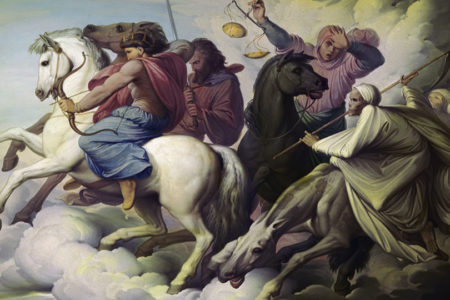Making the Wrong Assumptions
Never assume anything.” This well-known adage works particularly well when applied to the science of biblical interpretation. Assuming too much about a scriptural text can lead to inaccurate conclusions that miss the meaning the Lord intended.
A good example of this situation comes from Matthew 24:34 where Jesus, speaking of a future time of terrible trouble, followed by His return, stated, “Assuredly, I say to you, this generation will by no means pass away till all these things take place.”
Through the years teachers and preachers have made such inaccurate assumptions about this text that they have created confusion and frustration. Some have even gone so far as to date Jesus’ return to Earth. These improper assumptions concern three areas: (1) the word generation,(2) the phrase all these things, and (3) the identity of the fig tree in verse 32.
Generation. Not long ago people assumed the word generation indicated a fixed period of time, specifically, 40 years. Actually, a generation is not limited to 40 years. Only once (Gen. 15:16) does the Bible even use the word to denote a specific amount of time, in this case, 100 years. The word can be used to denote generations of 20, 40, or more years.
Further, generation is not limited to the element of time. It could, in some instances, be used to categorize people of similar age, occupation, or social status. Consequently, some scholars now conclude that, in this passage, generation refers to the nation of Israel, meaning that Jesus guaranteed the continued survival of the Jewish people.
All These Things. Although it may seem natural to believe Jesus spoke about the disciples and their contemporaries, certain elements of the Lord’s prophecy do not fit this interpretation. The disciples no doubt later witnessed the horrors involving the destruction of Jerusalem and the Temple in A.D. 70. But they did not witness the rest of the events that Jesus described as all these things. Never have the events of verse 29 occurred: “The sun will be darkened, and the moon will not give its light; the stars will fall from heaven, and the powers of the heavens will be shaken.” Thus, either Jesus made an inaccurate prediction (we know this to be impossible) or the disciples were not the “generation” to whom He referred.
The Fig Tree. Through the years many well-meaning folks assumed the blossoming fig tree in verse 32 symbolizes Israel. When Israel became a state in 1948, these people believed they would be the ones to witness Christ’s return. In other words, they viewed Israel’s rebirth as a prophetic time clock, ticking down until judgment came. They assumed a 40-year generation, which began with the establishment of the State of Israel, meant Jesus would return in 1988. A booklet on that topic came out in the early 1980s. It attracted a great deal of attention, even causing people to sell their possessions in expectation of the Lord’s return.
Obviously, they miscalculated. The Scripture says, “But of that day and hour no one knows, not even the angels of heaven, but my Father only” (Mt. 24:36).
Israel is called an olive tree in Romans 11:11–24 and a vineyard in Isaiah 5:1–7 and Luke 20:9–18, but never is it called a fig tree.
In addition, in the parallel account of Matthew 24, Luke quoted Jesus as saying, “Look at the fig tree, and all the trees” (emphasis added, 21:29). Jesus used the parable of the fig tree to convey a simple truth. The fig tree is nothing more than a fig tree; and when it puts forth leaves, summer is coming. Thus Jesus told the disciples that the generation to witness all the literal events of Matthew 24:4–31 will be the generation to witness His return.
His return is yet future. After the Rapture of the church, there will be a generation that will see all the events— “all these things”—Jesus described. Jeremiah 30 referred to them as the “time of Jacob’s trouble.” Daniel described them as the 70th week (Dan. 9:24). We refer to them today as the seven-year Tribulation.
The Rapture is a signless coming. To assume there will be a sign is wrong. As believers, we anticipate His imminent return to take us up to be with Him. Maranatha! Even so, come, Lord Jesus!







